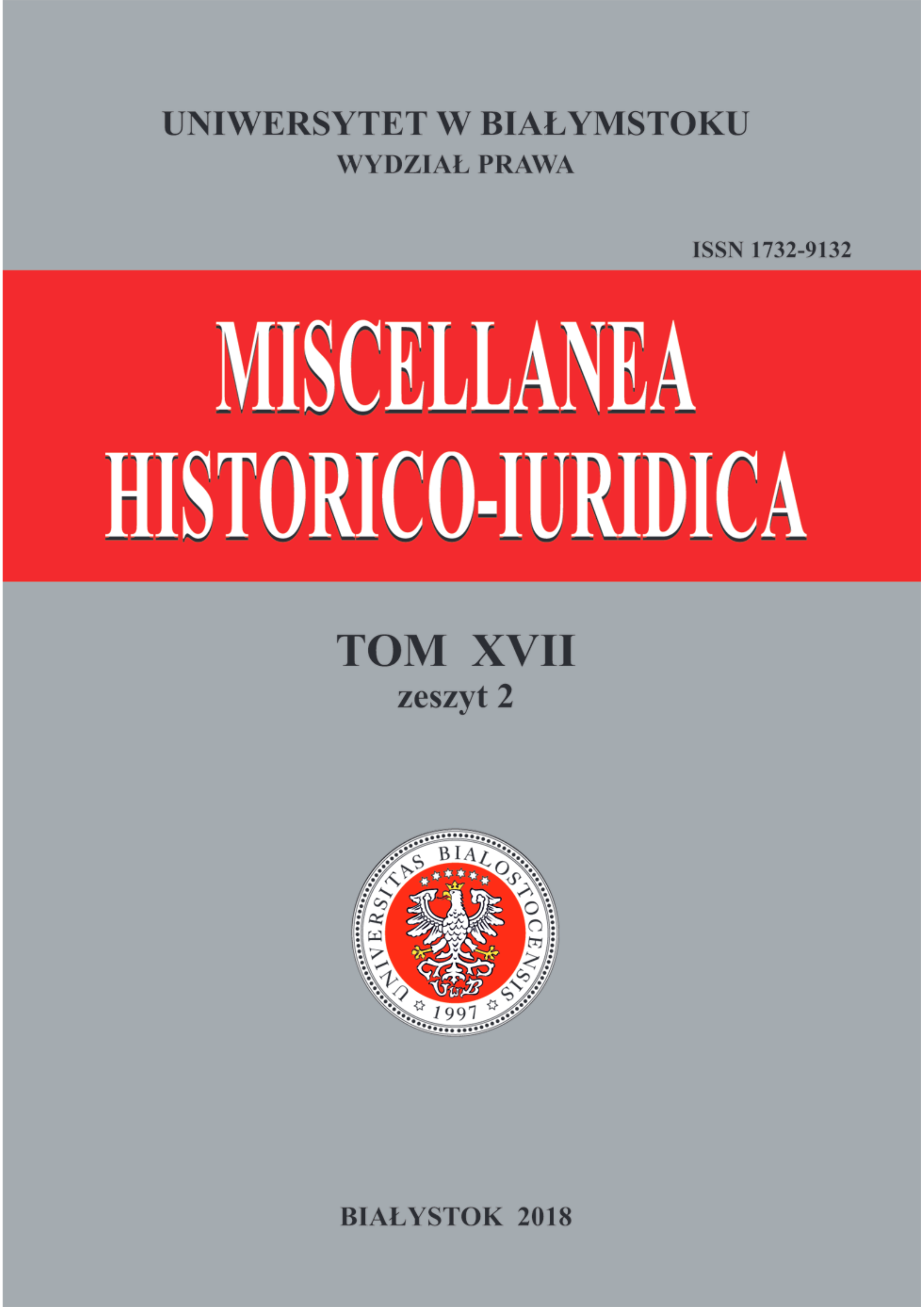Institution of Expropriation in Roman Law
Keywords:
Roman law, ius publicandi, expropriation, public interest, private ownershipAbstract
The issue of expropriation in Roman law has on numerous occasions been the subject of scientific research. The researchers have tried to explain the meaning of the term expropriation and show its role from a legal and social point of view. In Roman law, expropriation was referred to as publicatio and the right to expropriation was called ius publicandi. Difficulties associated with determining whether expropriation existed in Roman law results mainly from lack of source texts. On the basis of only brief information, various theories are currently being put forward. Some researchers believe that expropriation existed, others deny it. Preserved source texts, although few in number, argue that the institution existed in the Republic. What's more, it can be called the prototype of modern expropriation. It had to fulfill similar and often the same requirements that modern expropriation must meet, and thus there had to be a public purpose, expropriation was a last resort, and the expropriating party was burdened with the liability for compensation.
References
Adamiak B., Borkowski J., Kodeks postępowania administracyjnego. Komentarz, Warszawa 2005.
Alburquerque J.M., La protección o defensa del uso colectivo de las cosas de dominio público: especial referencia a los interdictos de publicis locis (‘loca’, ‘itinere’,‘viae’, ‘flumina’,‘ripae’), Madrid 2002.
Boć J., Obywatel wobec ingerencji współczesnej administracji, Wrocław 1985.
Bończak-Kucharczyk E., Ustawa o gospodarce nieruchomościami. Komentarz, Warszawa 2013.
Broughton T.R.S., The magistrates of the Roman Republic, I, New York 1951.
Carcopino J., La vie quotidienne à Rome à l’apogée de l’empire, Paris 1939, przekład polski: M. Pąkcińska, Życie codzienne w Rzymie w okresie rozkwitu cesarstwa, Warszawa 1966.
Cloppet C., Le droit et l’aménagement des voies publiques sous l’Empire romain, „KTEMA” 1994, z. 19.
Cram R.V., The Roman censors, „HSCP” 1940, z. 51.
De Buján A.F., Hacia un tratado de derecho administrativo y Fiscal Romano, [w:] Hacia un derecho administrativo y Fiscal Romano, red. A.F. de Buján, G.G. Kraemer, B.M. Osuna, Madrid 2011.
De Robertis F., La espropriazione per pubblica utilità nel diritto romano, Roma 1971.
De Ruggiero E., Lo stato e le opere pubbliche in Roma antica, Torino 1925.
‘Digesta Iustiniani’. Digesta Justyniańskie. Tekst-przekład, I, red. T. Palmirski, Kraków 2013.
Gdesz M., Cel publiczny w gospodarce nieruchomościami, Zielona Góra 2002.
Ignatowicz J., Stefaniuk K., Prawo rzeczowe, Warszawa 2012.
Jarosz-Żukowska S., „Słuszne”odszkodowanie jako konstytucyjna przesłanka dopuszczalności wywłaszczenia, „Przegląd Prawa i Administracji” 2005, z. 68.
Kamińska R., W trosce o miasto. ‘Cura urbis’ w Rzymie w okresie republiki pryncypatu, Warszawa 2015.
Kamińska R., The Censors’ Work in the Administration of Building Projects in Republican Rome, „Zeszyty Prawnicze” 2017, z. 17.2.
Lozano Corbi E., ¿Existio en la epoca republicana el derecho a la expropiacion forzosa por causa de utilidad publica?, „Revista de Estudios Histórico-Jurídicos” 1995, z. 17.
Nicolet C., Recherches sur la fiscalité directe sous la republique romaine, Bonn 1976.
Pijewski M., Decyzja i jej kontrola administracyjna i sądowa (wybrane zagadnienia), [w:] Samorząd terytorialny w Polsce a sądowa kontrola administracji, red. B. Dolnicki, J.P. Tarno, Warszawa 2012.
Ponte Arrebola V., Régimen jurídico de las vías romanas, [w:] Las técnicas y las construc-ciones en la ingeniería romana, V Congreso de la Obras Públicas Romanas, Cordoba 2010.
Scevola R., ‘Utilitas publica’, II. Elaborazione della giurisprudenza severiana, Milano 2012.
Scialoja V., Teoria della proprietà nel diritto romano, I, Roma 1928.
Sondel J., s.v. publicatio, Słownik łacińsko-polski dla prawników i historyków, Kraków 2005.
Szewczyk M., Konstytucyjna zasada słusznego odszkodowania i jej realizacja w ustawodawstwie zwykłym, [w:] Prawo administracyjne w okresie transformacji ustrojowej, red. E. Knosala, A. Matan, G. łaszczyca, Zakamycze 1999.
Tarwacka A., Prawne aspekty urzędu cenzora w starożytnym Rzymie, Warszawa 2012.
Tarwacka A., The Roman censors as Protectors of Public Places, „Diritto@Storia” 2014, nr 11, http://www.dirittoestoria.it/12/tradizione-romana/tarwacka-Roman-Censors-Protectors-Public-Places.htm
Taylor R.M., Public Needs and Private Pleasures. Water Distribution, the Tiber River and the Urban Development of Ancient Rome, Roma 2000.
The Digest of Justinian, red. A. Watson, t. 4, Pensylwania 1985.
Watson A., The State, Law and Religion. Pagan Rome, Athens – London 1992.
Woś T., Wywłaszczanie nieruchomości i ich zwrot, Warszawa 2012.
Zemke-Górecka A., Gospodarowanie nieruchomościami jednostek samorządu terytorialnego, [w:] Z zagadnień prawa rolnego, cywilnego i samorządu terytorialnego. Księga jubileuszowa Profesora Stanisława Prutisa, red. J. Bieluk, A. Doliwa, A. Malarewicz-Jakubów, T. Mróz, Białystok 2012.
Zoz M.G., Riflessioni in tema di res publicae, Torino 1999.







